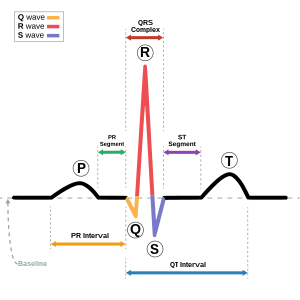Course Objectives:
Students will be able to apply the principles of electronic circuits and devices to the use and design of instrumentation in the biomedical area. They will have gained a basic knowledge of the operating principles of electrical and other transducers, analog and digital instrumentation, applied signal acquisition and processing, electrical safety in the medical environment, electrical properties of nerve and muscle physiology; and instrumentation used in cardiopulmonary, neurological, surgical, and rehabilitation areas of medicine.

Schematic diagram of normal sinus rhythm for a human heart as seen on ECG (with English labels). (Photo credit: Wikipedia)
Lecture 3 – Errors in measurement; Differential amplifiers; Non-ideal op-amps
Lecture 4 – Active filters design
Lecture 5 – Noise and coherent interference
Lecture 6 – Body Bio-potentials; Electrodes
Application examples:
Bert-Uwe Köhler, Carsten Hennig, Reinhold Orglmeister; The Principles of Software QRS Detection. IEEE Engineering in Medicine and Biology. January/February 2002; pp. 42 – 57.
Application Example:
Gabriella Balestra, Stefano Frassinelli, Marco Knaflitz, Filippo Molinari; Time-Frequency Analysis of Surface Myoelectric Signals During Athletic Movement. IEEE Engineering in Medicine and Biology. November/December 2001; pp. 106 – 115.
Lecture 11 – Blood Pressure Measurements; Small displacement sensors
Lecture 12 – Temperature Measurements
Lecture 13 – Blood Volume And Flow
Lecture 14 – Stimulation of excitable tissues
Lecture 15 – Positional Sensors
Lecture 16 – Electrochemical Sensors
Lecture 17 – Analog to digital converters. Applications
Lecture 18 – Electrical Safety

